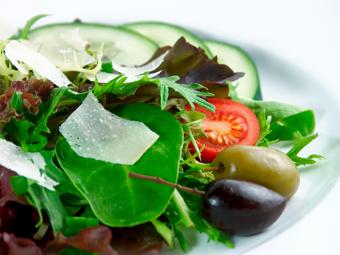
The Mediterranean diet isn't much like a diet at all. Rather, it is a way of living, and a luxurious one at that. The foods that you should eat on this diet are delicious, and can be served at any dinner party without anyone having a clue that dieting is at all involved.
Fish
Fish is a staple item for this way of eating. Naturally low in calories and fat, the fat that fish does contain are omega-3 fatty acids, which are highly touted by doctors and nutritionists for lowering 'bad' blood cholesterol, and raising 'good' cholesterol levels. It is also known for helping to combat depression, so with the Mediterranean Diet, not only do you get to lose weight and be healthy, but you'll be happier as well. Other seafood, such as squid, lobster, and shrimp is also featured prominently in the diet of the Mediterranean people.
Olives and Olive Oil
In Italy and Greece, people do not slather butter on their bread. Rather, they dip it into flavorful extra-virgin olive oil, which is often enhanced with herbs and spices. It is not uncommon for a variety of olives to be used as a pre-dinner appetizer. Most Italian and Greek recipes also call for the use of olive oil when a fat is needed, as opposed to other oils. Any diet based on the Mediterranean will have an abundance of olive oil in it. Olive oil, as it turns out, is also known for raising levels of HDL, the 'good' cholesterol.
Red Wine
In moderation, that is, one or two glasses of red wine per day has been proven to be quite healthy. It is full of flavonoids, which help to fight cancer-causing agents, and the alcohol can have a beneficial effect on blood vessels. Surely, the relaxing effects of a glass or two of good wine contribute to this effect. This is one case where more is not better, however. The health benefits quickly become outweighed when people overindulge.
Walnuts and Almonds
Walnuts, like fish, are also high in omega-3 fatty acids. Almonds are high in magnesium, and have been shown to be rich in flavonoids. Both are recommended, in moderation.
Fresh Produce
The inclusion of fresh produce is the key to this diet approach. While the other foods are healthy, one can imagine becoming quite plump on a diet of fish, olive oil, and wine. Lots of fresh fruits and vegetables are essential to the success and healthfulness of this diet. Vegetables have a variety of agents that are proven to lower cancer rates, and they also contain valuable fiber. It is easy to see how weight can be lost and health gained when individuals choose to eat fruit after their dinner as opposed to a slice of pie or other dessert. Try keeping a selection of fruits and vegetables readily available.
Grains
Grains are the basis of the diet in any civilization. While the Mediterranean people eat refined grains just as we do, they generally eat them in smaller portions. Also, in certain parts of the Mediterranean, people continue to make breads using whole grains, which are higher in fiber and vitamins. Whenever possible, you should choose whole grains.
Beans
Think about minestrone soup. Chock full of beans, vegetables, and pasta, it is the perfect example of a healthy Mediterranean dish. Dishes featuring legumes are plentiful throughout the region. Lentils, chickpeas, and white beans are all popular choices.
As you can see, the Mediterranean way of eating is not one of deprivation. Eating portions in moderation and adding in a bit of exercise a la walking down a cobbled street, and you will find that your health improves while you indulge in the finest foods our earth has to offer.
For more detailed information, check out the Mediterranean Diet Book.







